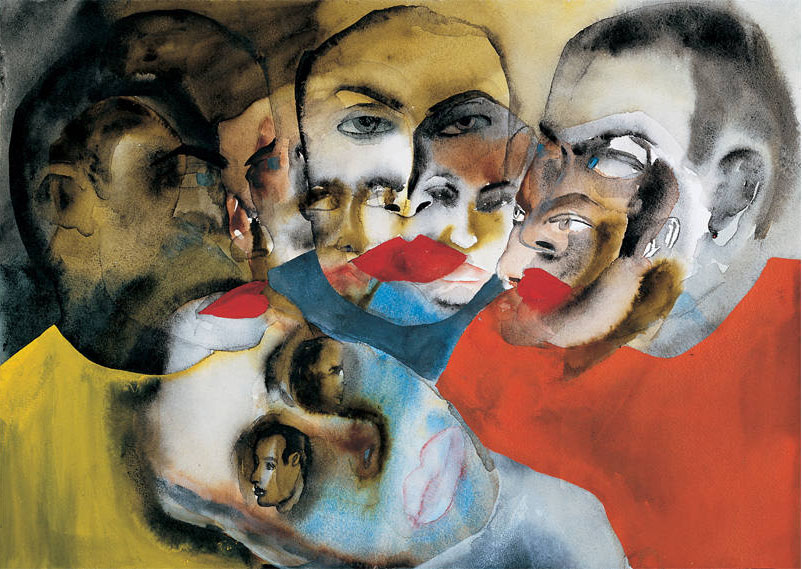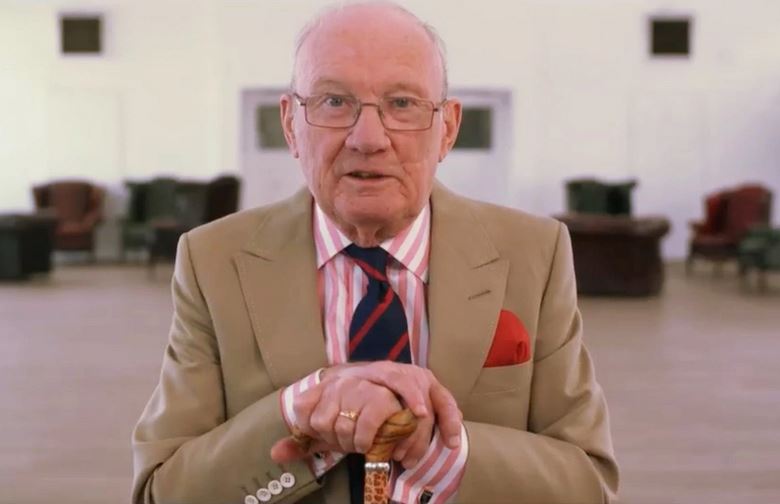Engaged by the Wicked
by Theodore Dalrymple (October 2020)

Ritz, Francesco Clemente, 1983
I have reason to be grateful to a British writer called Brian Masters. His name is not a household word, perhaps, and I am sure that he would not claim to be among the first rank of writers: but he nevertheless wrote by far the best book on serial murderers that I have ever read, the most profound attempt (doomed, of course, to failure) to understand and enter the mental world of a man who strangled fifteen young men to death, sat on the sofa and watched television with their corpses, and was finally caught because he blocked the drains of the house in which he was living while trying to dispose of their dismembered and boiled remains.
Mr Masters wrote a favourable review of a book of mine twenty-six years ago, the only favourable review that it received. Of course, I thought that he had understood the book whereas my detractors had not. I was particularly grateful because his review contained words that could be extracted and used for the cover of a subsequent edition.
Strictly speaking, I had no reason to be grateful to him, for he had only written what he thought. We had never met or corresponded, and he was therefore not doing me a favour. This was not a case of mutual back-scratching of the kind that is far from unknown in the literary world. I was once accused of that activity myself in the pages of the Times Literary Supplement after I had written a praising review of a book (praised by everyone else who reviewed it) because the author had included a book of mine in the acknowledgements. The author whom I praised was also the deputy editor of the literary pages of a daily newspaper (a fact which establishes that the story is now an old one), who had twice asked me to review books for him. The clear implication of the article in in the TLS was that, by praising his book, I was currying his favour with him and soliciting further employment. This was completely untrue and I could have claimed that it was a gratuitous and damaging assault on my reputation. Who would ask me to review books if I were known to be corrupt in this fashion? If I had made a claim for libel, it would have been in my interest to exaggerate the harm done to me, which in the end was, as I always expected it to be, nil. I knew perfectly well that I was the only person in the world to take notice of passing mentions of myself, however libellous, but no doubt if I had chosen to sue—for the libel was a libel—I should have received a cheque almost by return of post. I did not want a reputation as litigious, however, besides which I knew the editor of the TLS slightly, whom I liked and who had not been the author of the libel.

He wet the bed at night until comparatively late in his childhood—as did I. I remember the terrible humiliation of it, the horrible feeling of the protective plastic or rubber sheet used to protect the mattress, my frantic attempts to dry the linen sheet above it before anyone noticed the following morning, by waving it in the air or placing it on a heater in the middle of the night, though this deception was in vain because, even if dried, the sheet bore the undoubted stigmata of my weakness or wickedness, whichever it was (though I could not have helped either). Only we former bed-wetters can imagine the misery of this condition when it carries on much later than it should. Strangely enough—or perhaps not—this misery is one of the my most vivid memories of childhood and, though I do not often do so, I can easily recall it to mind. Perhaps I should start a pressure group called Survivors of Nocturia, though against whom we have a grievance or could pressurise or, even better, sue for compensation is not obvious.
Brian Masters subsequently went to a grammar school, that is to say a school that selected its children on the basis of intelligence and scholastic aptitude. It was the making of him, as it had been that of my own father, also born in East London in conditions that we should now consider deeply impoverished. As far as educational standards were concerned, no allowances were made for the poverty of the pupils (as children at school were then still called): Masters was expected to learn in precisely the same way as more favourably-placed children, and discipline was strong if not always just. He thrived academically as a result.
He then went to study French and Romance philology at university, an extraordinary choice for someone of his background, though he had had the benefit of inspiring teachers at school to help him choose. I remember a young patient of mine who, forty to fifty years later, came from a slum background and who also wanted to study French at university. In a way, her choice was even more remarkable for, in the intervening period, educational encouragement of children from slum backgrounds had declined enormously, in large part because of a decline in confidence in what should be taught. Masters’ teachers had had no doubt about what they ought to teach him and what he ought to learn; but these days, between post-modernism and multiculturalism, very little is either taught or learnt in many of our schools, especially in the slums, and whatever is taught or learnt is probably wrong.
Furthermore, the studious sheep are no longer separated from the recalcitrant goats, so that the latter completely dominate the classroom and the school. My young patient who mysteriously had formed the ambition to study French said something to me that I have never forgotten, and which seemed to me simultaneously tragic and emblematic of a deep and now abiding social problem. ‘The other girls,’ she told me, ‘say that I’m stupid because I’m clever.’ In other words, to adapt Paradise Lost slightly: Idiocy, be thou my intelligence.
Masters was clearly a remarkable boy, or young man. In order to write an article for a school magazine that he had founded, he wrote to Gilbert Harding for an interview. Although now entirely forgotten, Harding was at the time the most famous man in the country. He appeared on television—then only just beginning to be the opium of the people—in various guises, as commentator, interviewer and participant in game shows. Formidably intelligent and knowledgeable, he was also irascible, rude and drunken. He never used his brilliant gifts for any solid achievement, despised himself for this failure, and abused himself to death at a comparatively early age. His unpredictability and obvious spontaneity, as well as brilliance, made him beloved of, and admired by, millions. Masters’ portrait of this man is as good a portrait of flawed brilliance as I know.
Quite against his expectations, for Harding usually made himself inaccessible, Masters not only received an invitation from him in response to his request, but soon became almost a secretary and something of a companion to him. The encounter with a man who knew everyone, and was known by everyone, changed his life by changing his idea of the possibilities of life.
Eventually, after obtaining his degree in French with the highest possible marks, Masters gained entry fortuitously into aristocratic circles by answering an advertisement for someone to teach French conversation. The person who placed the advertisement was the Marquis of Londonderry. Contrary to what many might have supposed, this aristocratic world was much more welcoming than, say, that of modern commercial oligarchs would have been. After writing some short guides to French authors such as Sartre and Camus, he wrote a book about the dukes of Great Britain (other then the royal ones), of whom, as I discovered to my surprise, there are twenty-eight. He now lived in a world very different from the bombed-out East End of London into which he was born.
He does not say this, but his homosexuality may have been an advantage to him, notwithstanding whatever psychological problems, difficulties or regrets it may have caused him, at least in two respects: it ill-fitted him for the beer-and-football working-class culture that might otherwise have been his (it is advantageous to a writer to felt himself a little alienated from his world); and it facilitated his entry into artistic circles.
It is curious, then, that by far his best known books are about serial killers, of which his Killing for Company is as near a masterpiece as the genre will permit. But extremes—such dukes and serial killers (which tend to overlap little) —attract. One feels, no doubt without real foundation, that by knowing the extremes of society one has gained insight into all that lies in between. It is a little like the feeling, also without much justification, that one’s real character can emerge only in the most difficult circumstances. Actually, good fortune is at least as much a test of character as is ill-fortune, and probably a higher proportion fail it. Come to think of it, all of life, at every moment, is a test of character, even fortune which is neither good nor ill but only mediocre or average.
Some people have written of Mr Masters as if the two poles of his character were those of social climbing on the one hand and of salacious sadism on the other: he has been accused of both. I think this is unfair. Denying the latter charge, he says that far from any sympathy for extremes of cruelty, he has always tried to avoid it in his actual conduct. He says in his autobiography:
There is no question that my sympathies lie with the innocent; and yet my interest is engaged by the wicked. It seems to have been thus simultaneously for a long time.
Surely he is not alone in this. Wickedness exerts a fascination for us that goodness, however much we praise it, does not. It is much harder for an author of fiction to create a memorably good character than a memorably bad one. Goodness limps, wickedness flies.
Because we mostly think of ourselves as good, or at least inclined to good, we feel that good actions need no explanation. It is obvious that the man who goes out of his way to help a blind person cross the road is acting from the purely benevolent motives that we ourselves would have in the same situation. In my experience as a doctor, no one ever asked, ‘Doctor, why do I keep doing these good things?’ By contrast, I must have been asked hundreds of times by patients why they continued to do bad things—and they asked even when doing their bad things had no deleterious practical consequences for themselves.
When bad actions or deeds reaches the level of evil—the precise point is no more definable than at which height a man becomes tall—we are really puzzled. We can envisage ourselves behaving badly, because we all have behaved badly at some time or other, but we simply find mysterious the kind of conduct that Mr Masters was so brilliant at describing, without having finally plucked out the heart of its mystery—as we shall never do. But we are doomed, or delighted, to try.
«Previous Article Table of Contents Next Article»
__________________________________
Theodore Dalrymple’s latest books are The Terror of Existence: From Ecclesiastes to Theatre of the Absurd (with Kenneth Francis) and Grief and Other Stories from New English Review Press.
NER on Twitter @NERIconoclast<